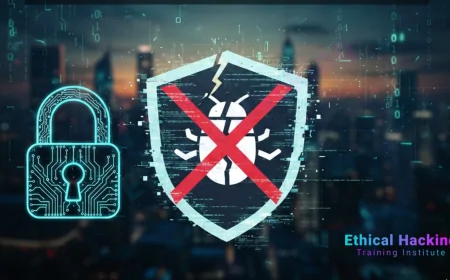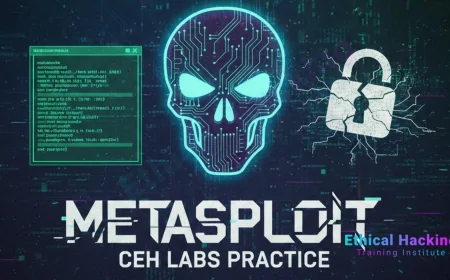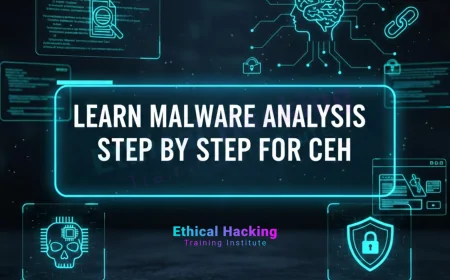CPENT Certification Requirements & Eligibility | Who Should Apply in 2025?
Learn the full CPENT certification requirements, eligibility criteria, and who should apply in 2025. Discover if you're the right fit for this elite ethical hacking course and how it boosts your cybersecurity career.

In the evolving field of cybersecurity, professionals must constantly upgrade their skills to keep pace with increasingly sophisticated threats. One certification that has quickly gained recognition for its rigor and practical focus is the Certified Penetration Testing Professional (CPENT). This advanced certification challenges ethical hackers to perform in real-world cyber environments, making it a critical credential for serious penetration testers.
This blog will explore the CPENT certification requirements in depth—covering the eligibility criteria, technical prerequisites, exam structure, and more. It will also discuss who should apply for this credential, highlighting different professional backgrounds and roles that benefit from CPENT.
What Is CPENT Certification?
The CPENT (Certified Penetration Testing Professional) certification is a hands-on cybersecurity credential that validates an individual’s ability to perform advanced penetration testing in real-world, complex network environments. Unlike theoretical exams, CPENT requires test-takers to exploit live systems and demonstrate practical offensive security skills.
It is one of the few exams that mimic a modern enterprise network and demand lateral movement, pivoting, web app exploitation, binary exploitation, and advanced post-exploitation tactics.
Why CPENT Stands Out in Cybersecurity Certification
-
Fully Practical, 24-Hour Exam
-
Real-World Corporate Network Simulation
-
Advanced Network Pen Testing + Web App Attacks
-
Binary Exploitation and Custom Scripting Required
-
Dual Certification Opportunity: CPENT and LPT (Master)
The exam tests much more than technical skills—it demands stamina, strategic thinking, creativity, and problem-solving under pressure.
Who Should Apply for CPENT?
This certification is not designed for beginners. It is best suited for professionals who already possess intermediate to advanced cybersecurity skills. If you're in one of the following roles, CPENT could be an ideal next step:
1. Penetration Testers
CPENT enhances your credibility by validating advanced offensive skills through a rigorous, hands-on exam.
2. Red Team Specialists
Red team professionals who emulate real-world threat actors benefit from CPENT’s emphasis on advanced exploitation and attack simulation.
3. Security Analysts
Analysts responsible for identifying vulnerabilities can deepen their skills by understanding how attackers think and operate.
4. Ethical Hackers
If you’ve completed beginner certifications (like CEH) and want to level up, CPENT is the logical next move.
5. Network Security Engineers
Those securing infrastructure will gain valuable insight into how attackers break in, helping them to build more resilient systems.
6. Cybersecurity Consultants
Freelancers and consultants who perform audits, assessments, and risk evaluations benefit from the credibility CPENT brings to client engagements.
7. IT Professionals Transitioning to Cybersecurity
Experienced IT personnel who already understand systems and networks can leverage CPENT to enter the security domain with authority.
CPENT Certification Requirements
While there is no formal prerequisite for CPENT, candidates are expected to possess a strong foundation in cybersecurity and ethical hacking. Here's what’s recommended:
1. Prior Knowledge of Penetration Testing
Before attempting CPENT, you should have hands-on experience with:
-
Footprinting and reconnaissance
-
Scanning and enumeration
-
Exploitation of common vulnerabilities
-
Post-exploitation techniques
-
Report writing and documentation
2. Familiarity with Networking Concepts
You must understand:
-
TCP/IP, ports, protocols
-
VPNs, firewalls, IDS/IPS systems
-
Routing, NAT, VLANs, and segmentation
3. Operating System Proficiency
The exam will test your knowledge in:
-
Windows Active Directory environments
-
Linux systems (privilege escalation, services, scripting)
4. Experience with Tools
Candidates should be fluent in tools like:
-
Nmap, Metasploit, Burp Suite
-
Wireshark, Nikto, Gobuster
-
Netcat, Powershell, Python, Bash
5. Scripting Skills
Knowledge of at least one scripting language is essential. Python is most commonly used in CPENT scenarios.
CPENT Exam Structure
The CPENT exam is 24 hours long, divided into two 12-hour segments or one continuous 24-hour session. Here's what it entails:
| Section | Description |
|---|---|
| Live Range | A fully simulated enterprise network |
| Objectives | Must meet challenge flags (score-based) |
| Duration | 24 hours (or split into two 12-hour sessions) |
| Passing Score | 70% for CPENT; 90%+ for LPT (Master) |
| Format | Practical labs, no multiple choice |
The candidate is expected to submit a detailed penetration test report after the exam—just like a real-world engagement.
Topics Covered in CPENT
To perform well in CPENT, you must master the following domains:
1. Advanced Windows Attacks
-
Fileless malware
-
Pass-the-hash and golden ticket attacks
-
PowerShell empire usage
2. Active Directory Exploitation
-
Lateral movement across domains
-
Kerberos attacks (Kerberoasting, ASREPRoast)
-
Exploiting Group Policy and misconfigurations
3. Binary Exploitation
-
Buffer overflows
-
Custom exploit development
-
Reverse engineering with tools like Ghidra or Immunity Debugger
4. IoT and OT Systems
-
Attacks on smart devices, SCADA systems
-
Protocol analysis and spoofing
5. Web Application Attacks
-
SQL injection, XSS, CSRF
-
RCE and LFI/RFI
-
Custom web shell deployment
6. Cloud Penetration Testing
-
AWS and Azure environments
-
IAM misconfigurations
-
Cloud storage attacks
7. Bypassing Security Controls
-
Antivirus and EDR evasion
-
UAC bypass
-
DLL injection and process hollowing
8. Wireless and Mobile Attacks
-
Rogue AP setups
-
WPA2 attacks
-
Mobile device emulation and interception
Recommended Skill Levels
You’re more likely to succeed in CPENT if you already have:
-
3+ years in cybersecurity or penetration testing
-
Prior certifications like CEH, Security+, or OSCP
-
Lab experience with virtual environments, Hack The Box, TryHackMe
-
Advanced reporting skills and understanding of risk scoring
What Makes CPENT Challenging?
1. Live Range Complexity
The exam network mirrors a modern-day enterprise environment, complete with segmented networks, firewalls, and custom defenses.
2. Time Pressure
You must exploit multiple systems within a limited time, prioritizing targets strategically.
3. Reporting Requirement
You’ll need to document every step, tool, and exploit clearly—this alone can take several hours.
4. Dual Certification Structure
Achieving 70% earns you the CPENT title, while 90% qualifies you for LPT (Master)—the highest level of penetration testing certification.
Common Misconceptions About CPENT
"It’s just another hacking cert."
No—CPENT is entirely practical. If you haven’t worked in live ranges or can’t script custom payloads, you’ll struggle.
"You don’t need scripting."
Wrong—Python and Bash skills are vital. You’ll need to write and modify code under pressure.
"Only offensive security pros can apply."
True, it favors offensive specialists, but defenders and analysts who want to think like attackers can benefit just as much.
How to Prepare for CPENT
Hands-On Practice
Spend significant time in live labs. Use platforms like:
-
TryHackMe
-
Hack The Box
-
VulnHub
-
Cyber Ranges
Master Scripting
Work with Python and Bash. Automate scanning, enumeration, and exploit steps.
Work on Active Directory Labs
Practice domain privilege escalation, lateral movement, and persistence.
Build a Report Template
Structure your findings clearly with screenshots, risk ratings, and remediation tips.
Simulate Time-Constrained Scenarios
Challenge yourself with timed exercises to build speed and accuracy.
Career Benefits of CPENT Certification
-
Increased credibility and job prospects
-
Higher salary potential for certified professionals
-
Eligibility for senior red team roles
-
Preferred qualification for global security roles
-
Validation of high-level offensive security skills
Who Should NOT Apply for CPENT (Yet)?
-
Absolute beginners in cybersecurity
-
Those without hands-on penetration testing experience
-
Candidates uncomfortable with command-line tools
-
Individuals unfamiliar with scripting or exploit development
-
Professionals with zero exposure to live labs or CTFs
If you’re in this group, it’s better to start with foundational certifications and gain experience before attempting CPENT.
Is CPENT Worth It?
Absolutely—if you're serious about becoming a top-tier penetration tester or red team expert. It pushes you to the edge of your technical abilities and prepares you for real-world engagements where creativity, problem-solving, and technical depth are required.
FAQ's
What is CPENT Certification and why is it important?
CPENT (Certified Penetration Testing Professional) is an advanced ethical hacking certification that tests candidates through a 24-hour practical exam. It is important because it simulates real-world network environments and challenges professionals to demonstrate elite penetration testing and offensive security skills, making it ideal for red teamers and senior ethical hackers.
Who is eligible to apply for CPENT certification?
Individuals with a strong foundation in ethical hacking, penetration testing, networking, and scripting are eligible. Candidates should ideally have prior experience in security assessments or intermediate certifications and be comfortable working in command-line environments like Linux and Windows.
What is the educational qualification required for CPENT?
There is no formal educational requirement for CPENT, but it is recommended that applicants have a background in computer science, IT, or cybersecurity. Practical experience with tools, networks, and systems matters more than degrees for this hands-on certification.
Do I need to complete CEH before CPENT?
Although not mandatory, completing CEH (Certified Ethical Hacker) or an equivalent certification is highly recommended. It builds the foundational knowledge needed for CPENT’s advanced penetration testing challenges, including system exploitation, report writing, and red team tactics.
Is CPENT suitable for beginners in ethical hacking?
CPENT is not ideal for beginners. It is an advanced-level certification meant for cybersecurity professionals with hands-on experience in ethical hacking, network security, scripting, and vulnerability exploitation. Beginners should start with foundational courses and real-world lab practice before attempting CPENT.
What skills should I have before attempting CPENT?
Before taking CPENT, you should be skilled in penetration testing, exploit development, network protocols, scripting languages like Python, Active Directory attacks, and advanced Linux and Windows operations. Familiarity with real-world attack simulations and security reporting is also essential.
How long does it take to prepare for the CPENT exam?
Preparation time varies, but typically 3 to 6 months of focused, hands-on training is needed. This includes mastering tools, completing cyber range challenges, developing scripts, and practicing reporting. A structured ethical hacking training program in Pune can accelerate your readiness.
What is the format of the CPENT exam?
The CPENT exam is a 24-hour practical test. Candidates can choose either a continuous 24-hour session or two 12-hour sessions. It takes place in a simulated enterprise network where candidates must exploit systems and submit a comprehensive penetration testing report.
What is the minimum passing score for CPENT?
To pass the CPENT exam, you need to score at least 70%. If you score 90% or above, you automatically qualify for the LPT (Master) certification, which represents the highest level of penetration testing expertise.
What job roles can CPENT certification help me qualify for?
CPENT opens doors to roles such as Senior Penetration Tester, Red Team Specialist, Cybersecurity Consultant, Vulnerability Analyst, and Ethical Hacker. It demonstrates a mastery of offensive security skills needed for high-impact roles in both government and private sectors.
Can CPENT help me get a job in Pune’s cybersecurity industry?
Yes, CPENT-certified professionals are in high demand in Pune’s growing IT and cybersecurity industry. Employers look for individuals with advanced hands-on capabilities in penetration testing, and CPENT is one of the top credentials that prove that skillset.
Does CPENT require programming or scripting knowledge?
Yes, scripting knowledge is essential for CPENT. You must be comfortable writing or modifying code in Python, Bash, or PowerShell. These skills are needed to create custom exploits, automate tasks, and navigate advanced systems during the exam.
Is CPENT better than OSCP for penetration testing careers?
Both CPENT and OSCP are highly respected. CPENT focuses more on enterprise-level network environments, Active Directory, and live-range simulations. It's ideal for red team roles. OSCP is more Linux-focused. Choose CPENT if you're targeting complex corporate security assessments.
What tools should I master before attempting CPENT?
Candidates should be skilled in using tools such as Nmap, Metasploit, Wireshark, Burp Suite, Netcat, PowerShell, and Python scripting. You should also be able to use debugging tools and understand AV/EDR evasion techniques.
Is hands-on training necessary for CPENT?
Absolutely. CPENT is a purely hands-on certification. You must complete practical challenges, exploit systems, and submit a penetration test report. Hands-on labs, cyber ranges, and ethical hacking projects are essential to succeed.
How does CPENT benefit experienced IT professionals?
For experienced IT professionals, CPENT offers a pathway into high-level cybersecurity roles. It validates your skills in advanced penetration testing and helps transition from infrastructure or network engineering into ethical hacking and security leadership positions.
Can CPENT be taken online from Pune?
Yes, the CPENT exam can be taken remotely through an online proctored system. Ensure you have a stable internet connection, dual cameras, and a quiet workspace to meet the exam’s strict monitoring and environment guidelines.
What are the career growth opportunities after CPENT?
CPENT-certified professionals can advance into roles like Red Team Lead, Cybersecurity Manager, Threat Intelligence Analyst, and Security Architect. It also opens doors to consulting, freelancing, and global roles requiring elite penetration testing skills.
What is the difficulty level of the CPENT exam?
CPENT is considered one of the toughest cybersecurity exams due to its real-time challenges, time constraints, and complex tasks. It requires a deep understanding of networks, systems, exploits, and advanced scripting. Consistent practice and live training are critical for success.
How can I find the best CPENT preparation course in Pune?
Look for ethical hacking training programs in Pune that offer advanced penetration testing modules, live lab access, experienced instructors, and exam simulation environments. Prioritize hands-on practice and real-world exercises over purely theoretical lessons.
Are You Ready for CPENT?
The CPENT certification is not for the faint-hearted. It’s designed for those who thrive under pressure, who want to prove their ability to exploit and secure complex environments. If you're an experienced cybersecurity professional, CPENT offers a chance to validate your skills and position yourself among the best in offensive security.
If you meet the requirements, have a hunger for real-world challenges, and want a certification that truly proves your capabilities—CPENT is the right path for you.
What's Your Reaction?
 Like
0
Like
0
 Dislike
0
Dislike
0
 Love
0
Love
0
 Funny
0
Funny
0
 Angry
0
Angry
0
 Sad
0
Sad
0
 Wow
0
Wow
0


















